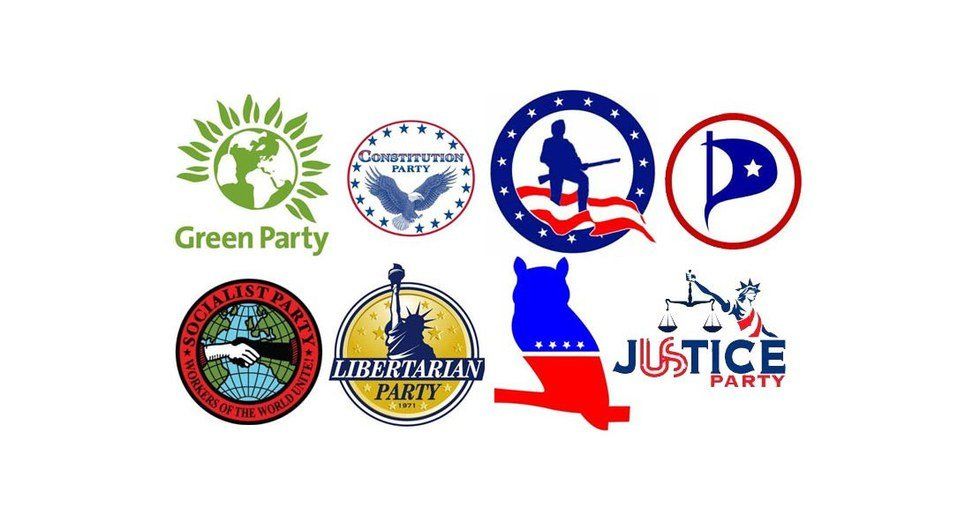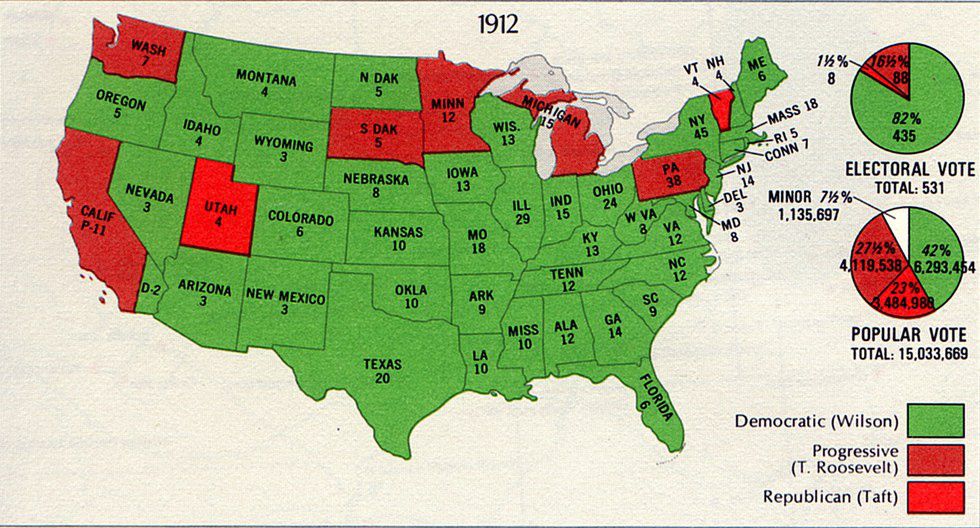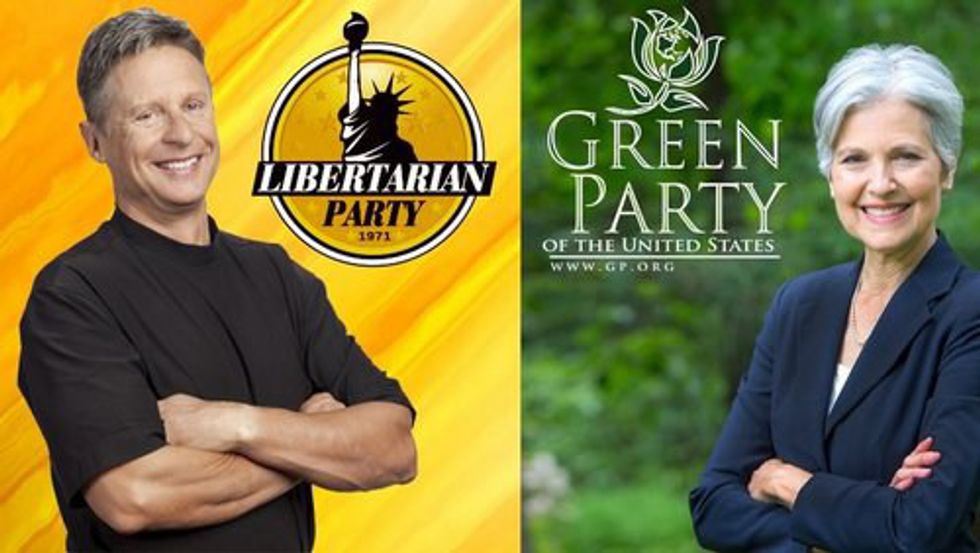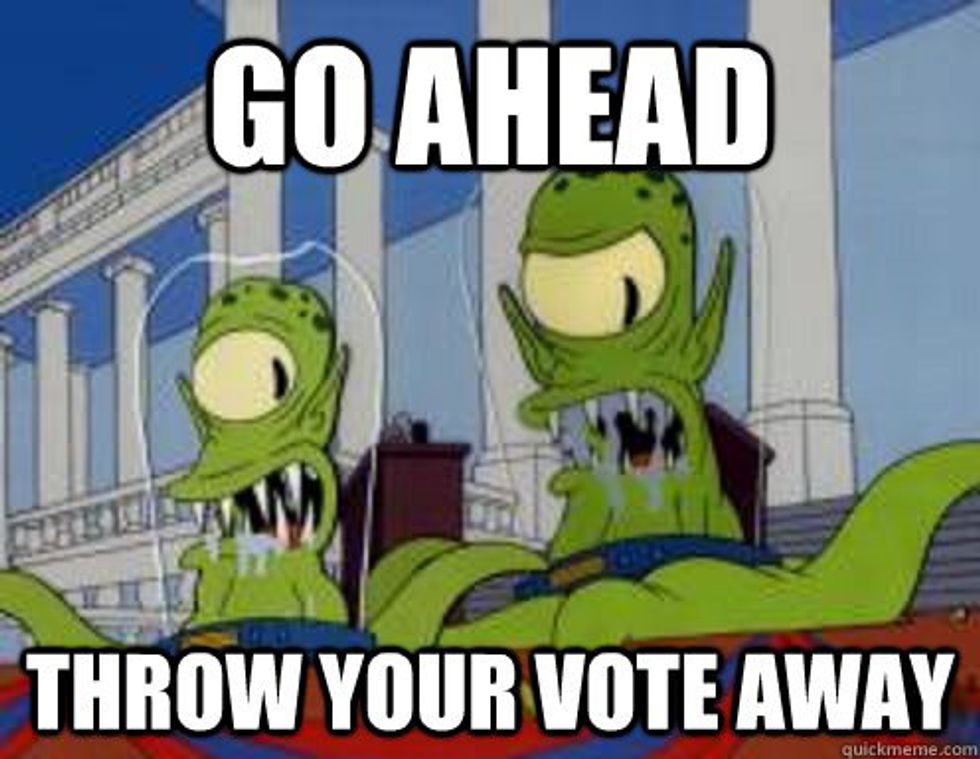A few weeks back, I was talking with a friend about politics, and how future elections would be impacted by the changes within the Republican and Democratic parties during the current election. We ended up talking more about the election, and eventually, the dreaded question reared its ugly head, "Who will you be voting for?"
To be honest, I've gone back and forth between candidates for this entire election. I used to be very conservative, but am currently a moderate in every sense of the word. As such, I've found it difficult to narrow my vote down to one particular candidate. I can say that for this election, I've considered voting for all four of the major candidates in Gary Johnson, Jill Stein, Donald Trump, and Hillary Clinton at least one point in the election season. I've always felt sympathetic to third parties, but I didn't want to waste my vote. Perhaps it was more important to prevent "Crooked Hillary" or the ringleader of the "basket of deplorables" from getting into office.
I ended up telling her that I would be voting third party. I am still not sure as to which party that vote will be cast for, but I am committed to my third party vote. She snubbed, and said, "go ahead and waste your vote." I stayed silent, not wanting to provoke further debate, as it would only result in the further deterioration of the quality of our conversation. Even so, I continued to think about the status of third parties in the United States, and why, despite the dissatisfaction with the current candidates, people will continue not to vote third party.
I think that voting third-party certainly has a stigma in the United States. Ever since the days of the Federalists and Democratic-Republicans, our country's leadership has been dominated by a two-party system. Even Theodore Roosevelt, who had already run for and won the presidency as a Republican, could only win six states and 27.4 percent of the popular vote in 1912 when he ran under his own Bull Moose Party. Third parties lack a strong precedent, and as such, many voters believe that they will not achieve office. This makes third parties the victim of circular logic, since, without those votes, there can never be this precedent for a third party president.
With that being said, third parties do tend to shine in policymaking. Oftentimes, they will shed light on issues that the larger parties overlook or ignore. For example, the opposition to the Patriot Act and other national surveillance measures comes primarily from the Libertarian party. Of course, there are democrats and republicans who oppose many of these measures, but neither of the major parties has committed to an official stance on this issue.
However, despite these victories, third parties are still not seen as viable on election day. Some of this is due to lack of information (many still do not know what the Libertarians stand for), and some of it is merely comfort with the current two party system. This is why it is essential to be an informed voter and to look at all of the potential options before casting a ballot. Certainly, voting for one of the major parties is perfectly fine, but I urge the prospective voter to look at other parties if they are dissatisfied with the current major candidates. Maybe one of the third party candidates better reflects your interests than the republicans or the democrats.
Certainly, there are many criticisms of third party involvement in the election. For example, some make the "throw away" argument, stating that votes for third parties are useless. This is because in the critic's mind, the third party is presumed to be unviable, and therefore, will not win the election anyway. It follows that since the third party will not win, voters should not consider it as an option, giving the party fewer votes.
This idea is flawed in that it invokes circular reasoning. It presumes that third parties are not viable in the first place, and then goes on to conclude that the third party will not win, and due to this, voters should not consider it. This presumption is faulty, because if a candidate were not viable (such as Mickey Mouse, although Mickey actually receives thousands of votes each election), they would not be listed on the ballot as an option. A third party will only become nonviable if the voters do not vote for it in the first place, so evidently, some interest must have been shown. Additionally, the mere fact that the arguer sees this third party as a threat (and is calling it a "throw away") is because their favored party is in danger of losing the election. This is the very definition of competition between the third party and the candidate in question, thus negating the argument.
Another common argument is the "lesser of two evils" argument. Basically, it states that "a vote for (insert third party candidate here) is a vote for (insert disliked opposition candidate here)." It goes back to the idea that third party votes could be "better spent" supporting the major party candidate that represents some of the third party interests. For example, this argument suggests that Libertarians should support the Republican Party and that Green Party voters should choose the democrats. This makes some sense since these parties often share similar voter pools to their larger counterparts. To vote for a third party would be to squander this larger party of its full support, thus letting the opposing major party win the election.
Again, however, this argument succumbs to a logical fallacy. The argument presumes that all votes "belong" to one of the two major parties, which is simply false. Votes are not property, but rather, a means of expression. It is an expression of individual choice and legitimacy, and it is core to the stability of a democracy. Votes do not belong to one party or another, as doing this would make the entire election (and thus the candidates) irrelevant
This argument is also an appeal to fear. It poses the opposition candidate as an external threat that needs to be stopped, essentially villainizing the other party. However, it does nothing to justify the other major candidate as a viable option; it merely portrays the opposition in a negative light. It relies on the presumption that third parties are unable to stop this opposition party from winning, and that the non-villainized major candidate is the only one that can "come to the rescue" of the republic. This is merely negative campaigning and does nothing to justify one party's legitimacy over another's.
Voting third party goes beyond merely writing a candidate's name on a ballot. It shows a dissatisfaction with the current political system and transcends the traditional binary view of the American political system. It rejects the idea of "catch-all" parties that compete for the votes of moderates and instead proposes that concerns not addressed by the major parties ought to be spoken by another voice. I believe that voting third party is anything but a waste of a ballot, but again, that is my personal opinion.
I urge everyone reading this to think critically about who they will be voting for, and why they are choosing that candidate. Be comfortable explaining why you chose that candidate to other people, and base your decisions in logic and reason. Do not succumb to fallacious arguments, such as the "lesser of two evils," or the "throwaway" arguments. Keep an open mind while you read and watch media. So long as you feel that you are voting for someone who you feel has your best interests at heart, you can vote completely guilt-free in the long run. I encourage everyone that is eligible to vote to do so, as it is an important right, responsibility, and duty of being a citizen of the United States of America.
Above all, however, do not let politics interfere with your relationships, your friendships, or your family. Treasure those relationships, and do not let such constantly changing political positions dictate who you can and cannot be friends with. By no means do you need to adopt your friends' views on certain issues, but perhaps it is important to understand where they are coming from. Perhaps one day, you can teach each other a lesson far more important than politics. That lesson is empathy.




























